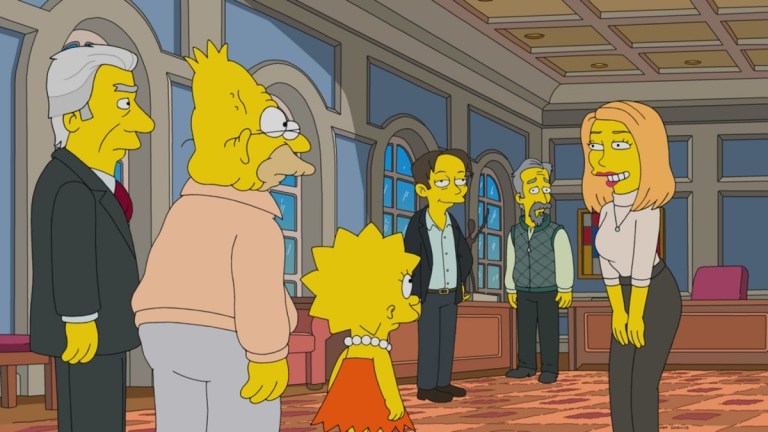The Simpsons Takes on Succession…and Burgers
Lisa and Abe find a tenderizing bond in The Simpsons’ "Meat Is Murder."

This The Simpsons review contains spoilers.
The Simpsons Season 33 Episode 21
When you’re as old as either Abe Simpson or The Simpsons, your past can come back to bite you on the pickle. “Meat Is Murder” is not another platform for Lisa’s vegetarianism. The episode is an attack on the insatiable appetite of corporate greed, and all the side dishes that go with it.
Using HBO’s Succession as foundation, “Meat Is Murder” features a stellar cast with the esteemed John Lithgow voicing the aging patriarch Gus, and his belovedly hostile family, Sheila voiced by Krysten Ritter, Mav (Seth Green), Jessica (Edi Patterson), Colby (Paul F. Tompkins), and their cousin Greg (Nicholas Braun). The guest family dynamic is wrought with drama. Each character comes ready-made with a defining flaw, which is ultimately the only reason to introduce them. Charli D’Amelio appears as a competitively dancing social media influencer, which is a stretch for her.
The establishing flashback sequence fully sidesteps any canon by setting up a plausible gap in Abe’s life: a short-lived minimum wage job. Grampa Simpson has admitted to a whole litany of jobs over 33 seasons, though none have hit the high note of nightwatchman of a grain silo. In “Meat Is Murder,” we learn young Abe worked at Gus’ modest roadside fast-food joint called Worth A Try Burger, and was humbled by the experience.
The dialogue in the sequence is tempered with self-effacement, which works both as witty repartee and as a character-setting device. Gus is a really nice guy (His radio jingle includes the line “the place next-door is pretty good too”) until he gets greased by some clown in a turtleneck.
The episode establishes the origin of the Krusty Burger chain, which is said to be celebrating 50 years. Even with Krusty the Clown’s big shoes, this also doesn’t step on canon, though it does borrow from Curb Your Enthusiasm. Opening a restaurant out of spite is not his biggest comedy crime. That goes to his product-placement feature, “Space Clown,” in which he admits “money is my oxygen.” Clowning is a license to steal, and Krusty steals more than jokes, he steals entire business plans: Using a clown as a spokesman to “sell cheap meat to fat people.” The only thing missing is golden arches.
The Krusty Burger chain was apparently built on the tears of a mad clown. The humor is in the accumulated details, dished out like so much secret sauce. Lisa finds little solace in the fact that Krusty Burgers were so cheap they never actually included meat, because the sodas are so cheap, they do. The Krusty Burger mascot names are easy to swallow, horribly dated puns, including Burger Reynolds, Jack Pickleson and Patty Melton John, who played at Princess Fries’ funeral. It works to give the entire setting a period feel.
Krusty’s arc is actually sadder than his ultimate backhanded semi-triumph makes it out to be. In the introductory flashback, he is appearing on stage at a coffeehouse with Lenny Bruce, Richard Pryor, and George Carlin, and his first heckle is a devastatingly timed “how is your comedy ending the war?” Very Simpsons. Krusty’s observation that caviar is fish “that will never be fish” encapsulates his entire character in a throwaway line.
Lisa once again has to do something bad for good causes. The company is evil. The bald and creepy guy from Shark Tank sits on their board. One of their subsidiaries sells handguns to dogs. “Polar bears are the only creatures I wish I had white privilege,” Lisa exclaims in a definitive declaration of liberal commitment. She can destroy the ninth richest person on the planet to make the world a better place, but to do so, she has to mislead her grandfather. This might not seem so hard to do, Lisa has a cognitive test app forever at the ready when visiting him. But she’s so easily duped she should check herself once in a while.
Grampa’s mental incompetence is the source of very competent comedy. When he becomes CEO of the Gus’ empire, he earns Republican bragging rights: Abe is now rich and greedy and not just too old to know how to change the channel. All of this acerbic social cynicism gets undercut when he fakes senility and continues the Simpson curse, because Grampa and Lisa’s conclusion is cavity-inducing.
Candy is dandy, but parodying Willy Wonka & the Chocolate Factory is quicker. It is a go-to source for Simpsons music, but it happens to be the musical section which works best in the episode. It also sets up Lisa’s challenge, she wants to change the world, but can’t afford it. The musical merge of the theme to Succession with The Simpsons’ theme is awkward, and almost as forced as the relationship between Lisa and Grampa. Marge only has one memorable scene, and while she doesn’t say anything, wooden dance clogs have never sounded so sad.
“Meat is Murder” is a well-balanced offering served fast. It is moving and didactic, but clever and underhanded. The story has depth, double-dealing, and a solid third act. There is an open “No Exit” corporate loophole, because the vote will forever remain deadlocked. But this makes it more sadistically subversive than a successful succession.
